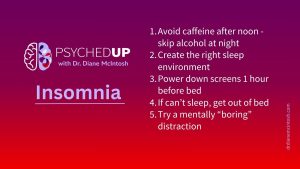
Struggling With Sleep? Here Are My Top Five Tips for Better Rest
I want to share my top five “sleep hygiene” habits that can support healthier sleep. They won’t solve chronic insomnia on their own, but they are essential ingredients for better rest.

Over my years of psychiatric practice, I’ve had patients of every age, gender, ethnicity and race. Some were living at home, while others were away at school, single, married, widowed, divorced or divorcing.
I’ve learned from every patient I’ve worked with, and those lessons have ultimately informed my own life choices.
One critical lesson has been about the power of social support: having a strong network of caring people, whether family, friends, or co-workers, builds and protects our mental health. I wrote this post to share on the health impacts of loneliness, and how important it is to build social connections.
It didn’t surprise me to learn that you can be lonely even when you’re surrounded by other
people.
However, I was surprised by patients who were socially isolated but denied
experiencing loneliness, because their beloved pet made them feel secure, loved and fulfilled. (More on benefit of pets for mental wellness here>>)
Mental illnesses promote worthlessness, hopelessness and helplessness, leaving many feeling isolated and lonely.
But loneliness is not a mental illness. It is, however, a very serious health issue.
A lack of social connections is associated with an increased risk of mental illness but also poor immune function, high blood pressure, cognitive decline and an increased risk of stroke, dementia and premature death. Loneliness and a lack of social support feeds into an unhealthy lifestyle, resulting in a greater likelihood of inactivity, smoking and drug use.
In 2018, the UK appointed its first minister of loneliness.
In November 2023, the World Health Organization determined loneliness is a global health priority and launched a new Commission on Social Connection.
Dr. Murthy’s report took a deep dive into what he described as an American public health crisis of loneliness, isolation, and lack of personal connection. He called for immediate attention and
kicked off the development of a national strategy to confront the significant social, health and economic impacts.
Like many Canadians, I now work almost entirely from home. I’m fortunate that psychiatry is uniquely suited to virtual care. Well before the pandemic, I adopted virtual care because for many of my patients, traveling to appointments was costly, time consuming and inconvenient. I still need to monitor labs and their physical health, but unlike other medical specialties, psychiatry doesn’t require the same level of physical assessment.
Despite my initial worries about their acceptance of virtual care, my patients were generally thrilled to have virtual access to appointments, but some mentioned they missed the in-person connection.
I now lead a team of 30, most of whom live in other provinces (and a few in other countries), so I’ve also seen the benefits and drawbacks of virtual connections from a different perspective. My
team members are mature and experienced, so they know what to do and how to do it and they thrive with their independence. However, when we do meet in person, there’s a completely different dynamic – more warmth, more creativity. Somehow, it feels safer.
While social media and other technologies have made it easier to connect with others, their rise has been mirrored by a decline in face-to-face interactions, worsened by the pandemic, which may have contributed to escalating self-reported feelings of loneliness and isolation.
Even self-described loners, who appreciate and thrive on their alone time, rarely eschew human connections completely. Humans are social beings. As children, we remain dependent on adults
for much longer than other mammals, because being attached to others is critical for our
survival. Yet, the same is true for adults of any age or cultural background, but especially so for
the elderly, those living with a disability and those who live in physically isolated areas.
The Surgeon General made many recommendations to address the loneliness epidemic, but he
didn’t just call on policymakers to address this issue through legislation. He asked every
American – individuals, families, communities – to take action.
After World War II, families reunited and started building families. The Baby Boomers were
raised during a period of growing middle-class wealth, and social networks also grew beyond
one’s own family. Bowling leagues, veteran’s groups, women’s auxiliaries – these created
opportunities to connect with neighbours, building strong, supportive communities.
Those types of organizations have declined over the last many decades. More women work
outside the home, air travel is the norm rather than a rare treat, and people have, perhaps due
to their more hectic work life, reduced their in-person social network.
At the same time, millions of people have developed their own alternative world, living online through an avatar that creates a life through virtual reality. In short, our world has changed.
There are countless ways to ensure you develop and maintain strong social connections. First
and foremost, if you’re struggling to reach out to others due to anxiety or another mental health
issue, it’s critical to seek help. Social anxiety is increasingly common but highly amenable to
treatment.
While the online world can be enticingly easy, it’s critical to build strong social connections, both
offline as well. Dr. Murthy urged his fellow Americans to prioritize spending time with friends and
loved ones and participating in social activities. Group activities that involve physical activity are
doubly valuable.
Regardless of your work situation, take any opportunity to give back to your community, because volunteering in any capacity always returns so much more than you give.
There are systemic issues that must be addressed for our communities to build more social
connectedness and reduce loneliness. One critical factor that impacts every Canadian is the
lack of access to physical and mental healthcare and social services.
Likewise, too many citizens are living below the poverty line and struggle to put food on the table and find affordable housing. I’m fortunate to live in Vancouver, where there is a robust social infrastructure, with many libraries, community centers and parks, which support social connectedness.
But whatever your role – as parent, partner, volunteer, co-worker or leader – you have an
opportunity to cultivate a culture of connectedness.
Make your connection with your loved ones a daily routine – whether by eating meals together, watching TV, preparing meals, or some other shared interest. Invite a new community member to join a group or activity that will start them on their way to feeling a sense of belonging.
At work, be inclusive and create norms that support every team member.
Reducing loneliness and its negative health impacts is critical for our prosperity, happiness and wellbeing. No one can do it alone.
This blog post is part of a series looking at the state of our mental healthcare system and ways we can create sustainable change to improve quality and outcomes for anyone impacted by mental illness.

I want to share my top five “sleep hygiene” habits that can support healthier sleep. They won’t solve chronic insomnia on their own, but they are essential ingredients for better rest.

There’s something about flipping the page on the calendar from December to January. For many of us, the beginning of a new year represents a clean slate. So, if you find yourself in the mood to take that time to pause and reflect after the holidays, here are a few tips on making smart New Year’s resolutions.

The holidays can be stressful. Here are a few thoughts on how to make the most of what can be a most wonderful time of the year.
Please provide your contact information in the form below. It helps if you provide enough detail in your message so we can help. We look forward to hearing from you!
Thank you for your message. We will respond to your email promptly.